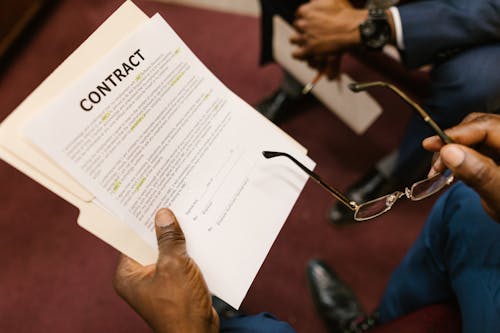Making sure that your contracts are as watertight as possible and in compliance with all relevant legislation, is not just good sense but also a legal requirement.
What is Contract Compliance?
Top of Page
Contract compliance is the process of making sure that all terms of a contract are being met by both parties. This can include things like verifying that services are being provided as agreed upon, that payments are being made on time, and that any other conditions in the contract are being followed.

There are a number of different ways to ensure contract compliance, but one of the most important is simply staying up to date on what's happening with the other party and regularly communicating with them. This way, you can catch any potential problems early on and avoid any misunderstandings or disputes down the road.
If you're interested in learning more about contract compliance or ensuring that your own contracts are being met, there are plenty of resources available online. There are also professional companies that offer contract compliance services, which can be helpful if you have a complex agreement or want peace of mind knowing that someone else is keeping an eye on things.

What are the Benefits of Contract Compliance?
Top of Page
There are many benefits of contract compliance, but here are some of the most important:
- Contract compliance ensures that all parties involved in a contract are adhering to the terms and conditions agreed upon. This helps to avoid disputes and misunderstanding down the road.
- By ensuring that everyone is complying with the contract, you can be confident that everyone is getting what they're supposed to from the agreement. This can help build trust between parties and foster healthy relationships.
- It can also help protect your interests in the event of a dispute or breach of contract. If one party isn't adhering to the terms, you'll have documentation to back up your case and pursue legal action if necessary.
- Finally, contract compliance can save you time and money by avoiding costly mistakes or delays caused by non-compliance.
How to Get Started with Contract Compliance
Top of Page
To get started with contract compliance, businesses should first assess their needs and identify which areas of the contract need to be compliant. They should then develop policies and procedures to ensure that all aspects of the contract are followed. Finally, they should establish a system to track and monitor compliance.
What are the Types of Contracts?
Top of Page
There are four main types of contracts: service contracts, purchase contracts, employment contracts, and lease contracts. Service contracts are agreements between two parties to provide a service, such as repairs, maintenance, or cleaning. Purchase contracts are agreements to buy goods or services. Employment contracts are agreements between an employer and an employee that outline the rights and responsibilities of each party. Lease contracts are agreements between a landlord and a tenant that outline the terms of the lease agreement.

What is a Non-disclosure Agreement (NDA)?
Top of Page
A non-disclosure agreement (NDA) is a legally binding contract between two parties that establishes a confidential relationship. The NDA defines what information can be shared and how it can be used. It also sets out the consequences of breaching the agreement.
An NDA can be unilateral, meaning only one party agrees to keep information confidential, or bilateral, where both parties agree to keep information confidential. NDAs are commonly used in business relationships, such as when two companies are considering working together or when an employee is hired by a new company.
NDAs are typically signed before any confidential information is exchanged. The NDA will state what information is considered confidential and may include other provisions, such as requiring the return of all confidential materials at the end of the agreement.
What is a Non-compete Clause?
Top of Page
A non-compete clause is a contract provision that prohibits an employee from competing with the employer during and after employment. Non-compete clauses are designed to protect an employer's business interests by preventing employees from leaving to start a competing business or going to work for a competitor.
Non-compete clauses can be found in employment contracts, partnership agreements, and other types of agreements. They are typically enforceable in court if they are reasonable in scope and time.
If you're considering signing a contract with a non-compete clause, it's important to understand what you're agreeing to. You should consult with an attorney to make sure you understand your rights and obligations under the agreement.

Creating a contract repository
Top of Page
Creating a contract repository is a critical part of any contract compliance program. A contract repository is a database that stores all information related to an organization's contracts. This includes the contract terms, contact information for the parties involved, and records of any changes or amendments to the contract.
Having a centralized repository for all contracts makes it easier to track and manage contracts, and ensures that everyone in the organization has access to the most up-to-date version of each contract. It also makes it simpler to run compliance reports and audits, as all the relevant data is stored in one place.
There are a few different ways to create a contract repository. One option is to use a dedicated contract management software system. These systems typically have built-in features for creating and managing contract repositories. Another option is to use a document management system such as Microsoft SharePoint or Google Docs. These systems can be customized to function as contract repositories, but may require some additional development work to set up.
Once you have chosen a method for creating your repository, you will need to populate it with data. For each contract in your repository, you will need to include the following information:
- Contract title
- Contract number
- Contract type (e.g., purchase order, service agreement)
- Start date
- End date
- Names and contact information for the contracting parties
- A summary of the key terms and conditions
- Any special provisions or clauses

What does a Contract Compliance Review do?
Top of Page
A Contract Compliance Review is an important service that helps to ensure that all aspects of a contract are being followed. This includes reviewing the terms of the contract, as well as any associated documents and records. This service can help to identify any areas where the contract is not being followed, and make recommendations for corrective action.
Can A Contract Compliance Review Recover Wasted Budget?
Top of Page
A contract compliance review can help your business recover wasted budget and improve your bottom line. It is important to have a clear understanding of what your business is spending on contracts and how those contracts are being managed. A contract compliance review can provide valuable insights into your business's contract management process and help you identify areas where improvements can be made.
When it comes to managing contracts, many businesses fail to realize the importance of maintaining accurate records. A contract compliance review can help you ensure that your records are up-to-date and accurate. This will allow you to make better informed decisions about your business's contract management process.
Another benefit of a contract compliance review is that it can help you identify potential risks associated with your current contracts. By identifying these risks, you can take steps to mitigate them and protect your business's interests.
Overall, a contract compliance review can provide your business with a number of benefits. It can help you save money, improve your bottom line, and protect your business from potential risks. If you are interested in improving your contract management process, consider scheduling a contract compliance review today.
How can contract compliance be improved?
Top of Page
There are a number of ways in which contract compliance can be improved. One way is to ensure that all parties involved in the contract are aware of their obligations and are committed to meeting them. Another way is to have clear and concise contract terms that leave no room for interpretation. Finally, having a third party monitor contract compliance can help ensure that all parties are fulfilling their obligations.

What are the Best Practices for Contract Compliance?
Top of Page
There is no one-size-fits-all answer to this question, as the best practices for contract compliance will vary depending on the specific industry and type of contract involved. However, some general tips that can help ensure compliance with contracts include:
- Read the contract thoroughly before signing it, and make sure you understand all of the terms and conditions.
- Keep accurate records of all correspondence and communication related to the contract.
- Make sure all deadlines are met, and keep track of any milestone dates or deliverables that need to be fulfilled.
- Comply with all contractual obligations in a timely and professional manner.
- If there are any changes or amendments to the contract, make sure these are documented in writing and agreed upon by both parties before they are implemented.
- By following these best practices, you can help ensure that your organization remains in compliance with its contractual obligations.